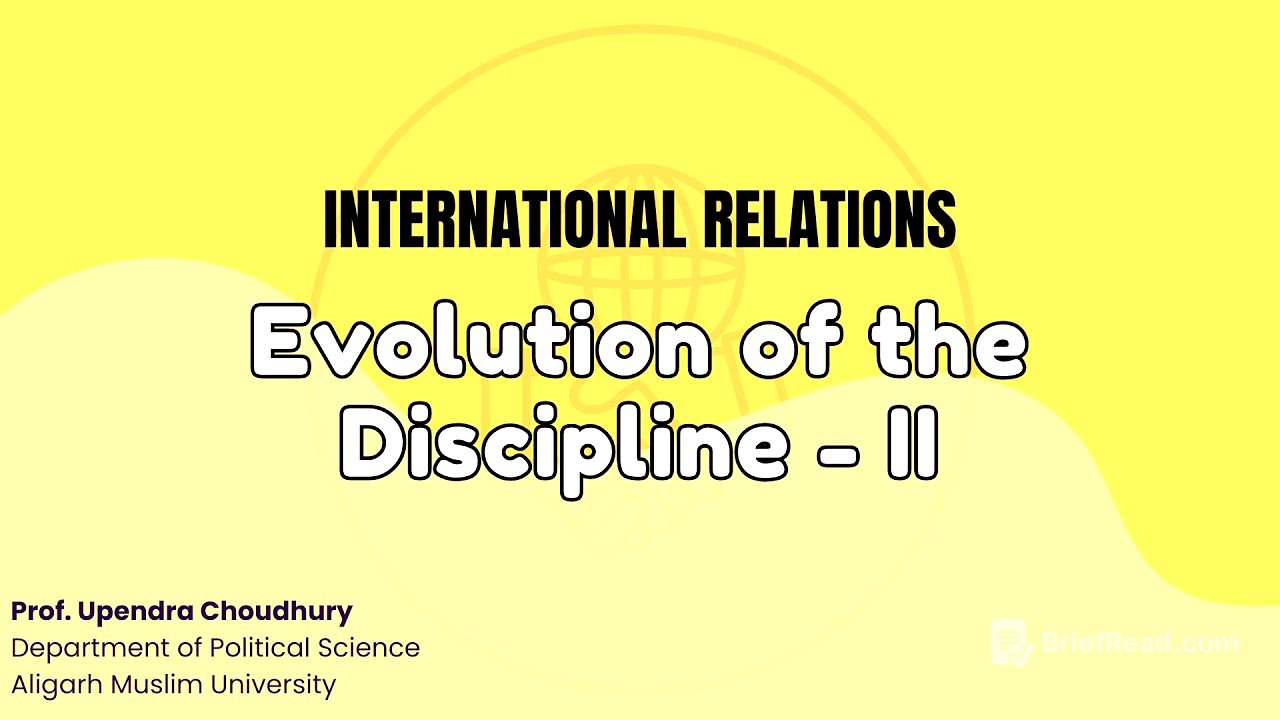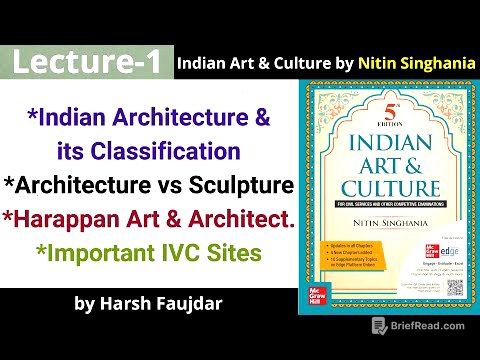TLDR;
This video discusses the evolution of international relations, focusing on major world events, European imperialism, the World Wars, and the Cold War. It also explores the development of international relations in India, globalization, and key events since 2000. The lecture concludes by highlighting the complexities and uncertainties that make the study of international relations fascinating and useful.
- Treaties of Westphalia and their impact on sovereignty and state systems.
- The influence of European imperialism and colonialism on global international society.
- The impact of the World Wars on the study and institutionalization of international relations.
- The effects of the Cold War, globalization, and recent global events on the discipline.
- The evolution and institutionalization of international relations in India.
Treaties of Westphalia [1:19]
The treaties of Westphalia in 1648 marked a significant turning point in the history of international relations by establishing the concept of state sovereignty, where each state has supreme power within its borders and is independent externally. These treaties ended the Thirty Years' War and led to the rise of secular authorities in Europe, diminishing the power of the Pope. They also facilitated the establishment of permanent national militaries and a core group of dominant states, such as Austria, Russia, Prussia, England, and France, which shaped world politics until the 19th century, leading to a period known as the "long peace."
European Imperialism and Colonialism [4:34]
European imperialism and colonialism significantly reinforced Europe's dominance in international relations for centuries, contributing to what is often referred to as eurocentrism. While imperialism led to the exploitation and destruction of colonized societies, cultures, and economies, as highlighted in Davai Naroji's book on British rule in India, it also inadvertently drove the creation of a global international society by linking previously isolated communities through conquest. This process of globalization eventually led to the dissolution of these empires in the 20th century, as European ideas of statehood and national self-determination inspired colonial liberation movements worldwide.
First World War [8:09]
The First World War, triggered by the rise of Germany, imperial competition, and modern industrial technologies, fundamentally reshaped international affairs. It ended the long peace and created an urgency for the systematic study of international relations, leading to its institutional establishment as a separate discipline in 1919. The primary objective was to understand the causes of war and the conditions for peace. Think tanks such as the Carnegie Endowment for International Peace and the Royal Institute of International Affairs played a vital role in consolidating the discipline. The League of Nations was established to manage interstate disputes through negotiation, marking the first attempt at creating an international institution for preventing war.
Second World War [11:30]
The Second World War began because certain states, particularly Germany and Japan, were dissatisfied with the post-World War I status quo, leading to the collapse of the League of Nations. The Allied Powers opposed the Axis Powers, resulting in the occupation of Germany and the surrender of Japan after the use of nuclear weapons by the United States. This war reinforced the realist belief that warfare is endemic to mankind and a central problem for the future. The post-war period saw the end of European imperial powers and the beginning of decolonization in Asia, Africa, and Latin America, leading to the emergence of the "Third World" and the establishment of the United Nations system.
Cold War [13:40]
The end of World War II led to the domination of two superpowers, the United States and the Soviet Union, and the beginning of the Cold War. This ideological rivalry introduced new issues for study in international relations, such as the arms race, proxy wars, and nuclear deterrence. Non-state actors began to influence international relations, marking a minor but significant development.
Evolution of International Relations in India [17:12]
In India, the study of international relations began during the freedom struggle, with institutionalization starting with the Indian Council of World Affairs in 1943. The Indian School of International Studies and the international relations department at Jadavpur University were established in 1955 and 1956, respectively. Numerous universities and think tanks have since contributed to research and teaching in this field, though their role in teaching remains limited.
End of the Cold War [20:44]
The end of the Cold War left the United States as the sole superpower, leading to a "unipolar moment." This introduced new dangers and opportunities, generating anomalies between existing theories and world developments. The failure to predict the collapse of the Soviet Union damaged the realist perspective, leading to renewed interest in alternative theories such as feminism and postmodernism. The Non-Aligned Movement lost its Cold War logic, and the World Trade Organization was established, with hopes for reforming the United Nations and expanding the European Union.
Globalization [24:33]
Globalization is understood as the widening, deepening, and speeding up of global interconnectedness, facilitated by the information technology revolution. Thomas Friedman identifies three areas driving globalization: states, companies, and individuals. The US hegemony in international relations allowed for the establishment of liberal democracy and economy as preferred ideologies, institutionalized through organizations like the World Trade Organization, World Bank, and IMF. The democratization process became a key element of US foreign policy, aiming to extend the zone of democratic peace. Critics argue that states remain key actors, while supporters point to the influence of non-state actors and the creation of a global civil society. Globalization has the potential to disrupt international society by easing the cross-border movement of people, goods, and ideas, threatening state sovereignty.
Major Events Since 2000 [30:52]
Since 2000, the world has witnessed an era of both globalization and de-globalization, with the rise of big tech companies challenging state authority. Costly US imperial ventures in Afghanistan and Iraq, the rise of India and China, the 2008-09 economic crisis, and the decline of US power have had major implications on the international system. Global issues such as environmental crises, nuclear proliferation, international terrorism, and the Russia-Ukraine war have significantly affected the structure of the international system, raising questions about the effectiveness and legitimacy of international institutions.
Concluding Points [33:50]
The disciplinary history of international relations provides insights into how the field attempted to establish its identity, though there is no consensus on the essential dimensions of its evolution. There is concern about the lack of attention to methodological issues and the exclusion of marginalized voices, including women. Issues of race and empire are often missing from mainstream theories. Combining different traditions of thought and acknowledging major events can provide a better understanding of the disciplinary history of international relations. These complexities and uncertainties make the study of international relations interesting, fascinating, and useful today.









